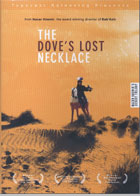
The Dove’s Lost Necklace (Le Collier Perdu de la Colombe) 1991
Distributed by Typecast Releasing, 3131 Western Ave., Suite 514, Seattle, WA 09121; 206-322-0882
Produced by Tarak Ben Amar
Directed by Nacer Khemir
Directed by Nacer Khemir
DVD, color, 90 min.
Jr. High - Adult
Gender Studies, Middle Eastern Studies, Storytelling
Date Entered: 05/15/2009
Reviewed by Monique Threatt, Indiana University, Herman B Wells Library, Bloomington, INThe Dove’s Lost Necklace is the second feature film in Tunisian director Nacer Khemir’s highly praised Desert Trilogy. Each film in the trilogy takes the audience on an emotional roller-coaster ride, at first slowly lifting the viewer up towards the heavens to soak in and understand the complexities of the story which are filled with overwhelming aesthetic and passionate discoveries, then suspending you for one brief intoxicating moment before plunging you back to earth with tales of tragedy and betrayal. At the heart of the trilogy are recurring themes of magnificent beauty, love, storytelling, and nomadic wandering. Khemir’s films are meant to invoke dialogue, to be multilayered, complex, full of abstract symbolisms, and faith.
At the heart of this film are intertwining love stories. Hassan (Navin Chowdhry) is a naïve and privilege teenager who is on a quest to find the true nature of love, while his young friend, Zin (Walid Arakji), optimistically longs for the love and the return of a father who abandons him in infancy.
Hassan is both a student studying Arabic calligraphy, and a collector of words. His Master makes a point to tell him that the calligraphy symbol “waw” is the only letter of the alphabet that is unique, multilayered like God, and is the letter of the traveler. These words foreshadow events to happen as Hassan journeys to the desert. Equally important to Hassan is his insatiable appetite to collect all 60 words that define the state of lovers. His unrequited attraction to his Master’s teenage daughter propels him to learn more about the nature of love. Due to Islamic customs, Hassan can only admire her from afar which he does quietly from a dove’s roost. Here, he innocently watches her play, carefree and unveiled, in her Garden of Eden.
One day, Hassan discovers a burnt page from a rare manuscript which he believes to hold the true secret of love. The torn page tells the story of Aziz, Princess of Samarkand. Hassan learns that the word Aziz describes yet another form of love. Wanting to know more about Aziz, Hassan charts a path to find the book in its entirety. His journey leads him to an ethereal encounter with the Princess, and together they cross the vast desert in search of the book. Unfortunately, Hassan and the Princess journey in the same path as a group of nomadic oppressed villagers determined to kill the Prince and members of the elite class. Hassan and the Princess are able to outwit the band of ragamuffins long enough to find the book. However, time is not on their side. Hassan and the Princess are eventually cornered to a high-altitude ledge where, to avoid certain death, they plunge into the river below. Sadly, the book and the soul of the Princess are eternally lost to the river. Greater sorrow awaits Hassan upon his return home. He finds his village burned, and pillaged, the great buildings in ruins, the love of his life and the villagers gone. Another generation lost to the desert.
The other tale in this film centers on Zin (Walid Arakji), a young boy who befriends Hassan, and optimistically wishes for the return of a father who abandons him in infancy. He is a slight nuisance to his Master and some of the local people. Yet, no one truly understands the hurt and pain he suffers, or understands why his behavior is odd and disruptive at times. Zin develops a close relationship with a monkey for all the right reasons, but he also believes the monkey is a reincarnate of his father. Like all children, there is an unmolested innocence about Zin. It made this reviewer want to hold him close and never let go. Sadly, in due time, Zin meets a heartbreaking end. In an ironic twist, Zin’s soul transitions to a heavenly place where he is reunited with his father.
The ubiquitous desert is full of stories, it is the story. Unfortunately, no matter how many footsteps or paths one tries to create in the desert, the shifting landscape easily erases those memories and stories. Oral storytelling is sacred to the dervish people who are able to pass along tales to the next generation.
This reviewer found it slightly difficult to comment on the technical aspects of the film. There are so many scenes that are meant to conjure up fantasy and imagination. Still, what is undeniable is the beauty of the landscape. The cinematography is phenomenally breathtaking. Jean-Claude Petit’s musical direction is par excellence. Khemir is a truly gifted filmmaker who easily takes his audience on a magic carpet ride to a world of great storytelling of mythical proportions.
The other two films in Khemir’s trilogy areWanderer’s of the Desert, and Bab’Aziz. The film is in Arabic w/English subtitles. Highly recommended for all libraries.
Awards
- Winner Jury Prize Locarno International Film Festival
- Winner Best Screenplay Namur Film Festival